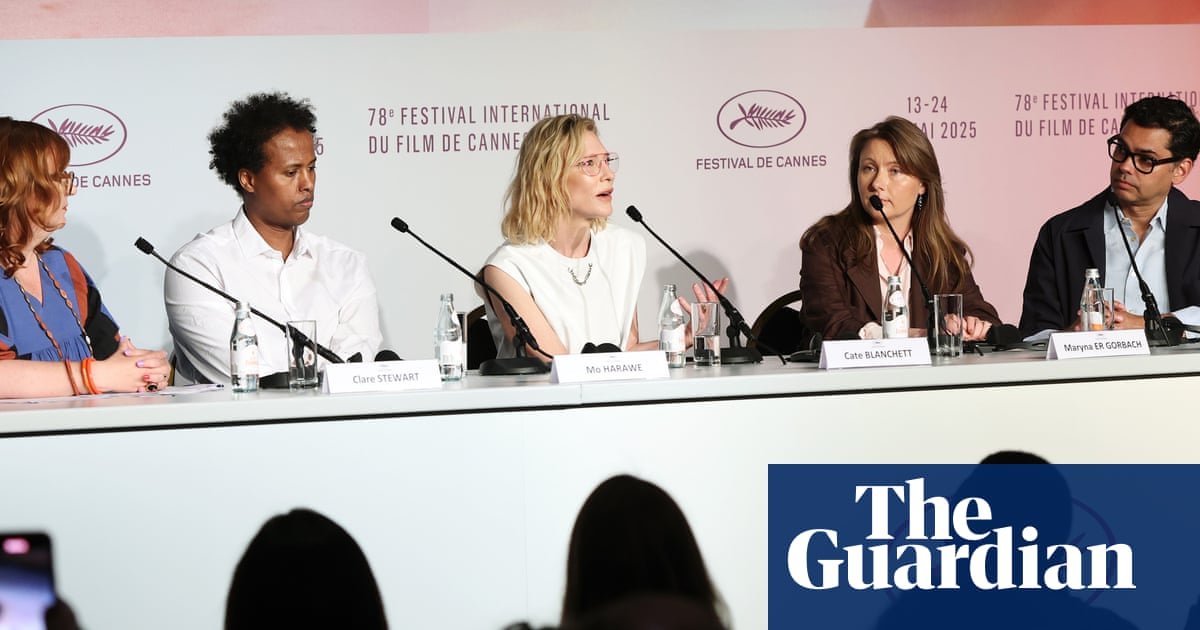Authoritarian regimes “first come for great acts of culture” when they start to curtail civil liberties,Cate Blanchettwarned as she launched a new grant for displaced film-makers.
Thetwo-time Oscar winnerand goodwill ambassador for the UN refugee agency (UNHCR), has teamed up with the international film festival Rotterdam’s (IFFR) Hubert Bals Fund to set up the Displacement Film Fund, which will support displaced film-makers or those with experience in refugee storytelling.
Its pilot version is bestowing a grant of €100,000 (£84,000) to five film-makers – Maryna Er Gorbach (Ukraine), Mo Harawe (Somalia, Austria), Hasan Kattan (Syria), Mohammad Rasoulof (Iran) and Shahrbanoo Sadat (Afghanistan) – whose short films will premiere at IFFR 2026.
“History has shown us that when authoritarian regimes start to curtail civil liberties, they first come for great acts of culture,” Blanchett told the Guardian on Friday.
“The metaphorical noses are always removed from statues. I think there’s a cautionary tale to the way artists are silenced; it’s often the thin end of a very thick wedge. And it’s undeniable that this is happening globally now. Oppression comes in many forms, and it’s touching all our lives to greater and lesser degrees.”
In the US, Donald Trump hasexerted control over which cultural pursuits the government backs, from taking the reins of the Kennedy Center to targeting “improper ideology” at the Smithsonian Institution. In the UK, Arts Council England became mired in controversy last year when it warned that “political statements” could break funding agreements after discussions with the government aboutartists speaking out over the Israel-Gaza war.
A recent report by Freemuse saidartistic freedom was more threatened globally than ever, citing a culture of “censorship (including self-censorship), imprisonment, travel bans, misuse of defamation, harassment, blasphemy legislation, misuse of anti-terrorism legislation” and violence.
Blanchett said the idea for a new fund was born after “a group of us collected at the global refugee forum 18 months ago, and pledged to one another that we would find a way to highlight displaced perspectives and help them find a more mainstream audience”.
It comes amid a global crisis, with 122.6 million peopleforcibly displacedowing to war, persecution or human rights abuses, according to the UN. This amounts to one in 67 people worldwide, with 71% of displacements occurring in low- and middle-income nations.
“Forced displacement around the world is one of the greatest challenges that we face as a species, yet it’s often outside the mainstream cultural conversation. When I started working with UNHCR 10 years ago, the numbers of forcibly displaced people around the world were approaching 60 million. They’re now over 120 and rising,” Blanchett said.
“I think it’s very easy to be overwhelmed by those numbers and to disconnect from the individuals behind the numbers.Refugeesare often stigmatised, demonised and ostracised. They are often used as political footballs. But during my travels with UNHCR, I’ve heard stories of resilience, and great humour, and have even found portals into my own experience. I found that I have much more in common with these people than the mainstream media would make me believe.”
The Australian actor, who has appeared in dozens of critically acclaimed films, including Tár, Carol and Blue Jasmine – and whocreated the 2020 Australian series Statelessabout unlawful detention in Australia – said it was important to find common themes in other people’s stories and experiences.
Film-making, she said, was a way to “break down” the barriers between us. “We’re told that refugees are coming for our jobs or going to disrupt civil society. But in fact, these people have so much to offer. They’re architects, lawyers, doctors, plumbers, they’re people who are highly skilled, whose lives have been put on hold, but their humanity has not,” Blanchett said.
Sign up toFilm Weekly
Take a front seat at the cinema with our weekly email filled with all the latest news and all the movie action that matters
after newsletter promotion
“These issues get politicised overly quickly, so there was an urgency to reclaim a positive, constructive discourse around them.”
Rasoulof fled Iran after the selection of his filmThe Seed of the Sacred Figto take part in the main competition at Cannes last year. His new, untitled short is set after the death of an exiled writer as his family tries to fulfil his wish to be buried according to his will.
The director said: “When I first heard about this fund and its incentives, I felt comfort, seeing that there are people who have this care and concern for us.
“It reminded me of the very specific moment when I was fleeing my country, when I was a step away from crossing the border. I looked at my homeland for one last time, and thought about all the other people who had to leave their roots, their culture, behind, and fight for their freedom of expression.”
Rasoulof said that, despite his experiences of “captivity and interrogation”, he didn’t flee Iran for comfort or security. “It’s not about that. It’s just about being able to go on working, being able to go on expressing myself. This is the case for many artists.”
